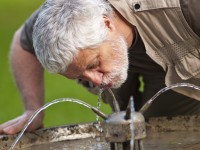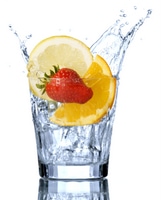Hydration for Health
Think Drink: Turn on the tap and turn on good health
We’ve all heard that we should be drinking more water but very few of us do anything about it. There are lots of excuses: “I don’t like the taste of water,” “I’d rather be drinking something like coffee or tea or soda,” “I just never think of drinking water,” or even “I don’t want to spend half my life in the bathroom.” But for all the excuses there remain very good reasons for drinking water. Primarily, we are water based creatures; our body is largely composed of water, normally 50-60%. So it only makes sense that our body needs water – and lots of it – to work properly.
Here is how water affects different part of our body.
Brain: Our brain is 75-85% water. Dehydration affects mental performance and has shown to decreased attention span and focus by 13% and short term memory 7%.
Mouth: water is needed for production of saliva, Lubrication of oral membranes and swallowing. Water also helps preserve voice functions.
Lungs: We lose water with every breath; this is increased in hot temperatures or dry air. Every day we lose the equivalent of a can Soda just with Breathing- this water needs to be replaced.
Heart: With dehydration the cardiac cells shrink and this may affect the transfer of electrical impulses which cause the heart to contract. Studies show that drinking 5 or more glasses of water a day can decrease the risk of heart disease.
Kidney: Our kidneys controls the amount of water in our body, filter the blood, and excrete waste into the urine, leaving necessary nutrients in the blood to the circulated. Because they regulate fluids in our body they also have a role in regulating blood pressure. The kidneys need water to preform all these functions. Dehydration can cause increase blood pressure, thereby increasing the risk of heat disease and stroke. Dehydration can also lead to urinary tract infections which in turn increase the risk of falls which can result in fractures or other serious injuries.
Stomach: Drinking water can aid in digestion by stimulating the production of saliva and digestive juices. IT will also help to curb appetite. Good water hydration further aids in weight reduction by decreasing the body’s metabolic rate. Drinking 500ml of water can increase the metabolic rate by 30%.
Bladder: Drinking adequate amounts of water can decrease the risk of urinary tract infection and kidney stones. You can check your level of hydration by the color of your urine: the brighter the color, the more dehydrated you are, with good hydration, urine is almost transparent.
Skin: the skin acts as a water reservoir and help with fluid regulations throughout the body. With moderate exercise we can lose 1-2L of water through sweat which will in turn produce fatigue and decreased performance. Good hydration will also make the skin look younger.
Blood: Our blood is 75% water and is vital for the transportation of oxygen and nutrients necessary for the maintenance of cell metabolism and structure. With dehydration the blood thickens which in turn makes the heart work harder.
How can I increase my daily intake of water to meet the suggested 6-8 glasses of water per day?
- Instead of coffee or alcohol which dehydrate, drink water.
- Have water constantly available; carry a water bottle with you.
- Have a glass of water with your coffee or tea.
- Have a glass of water before a meal to cut down on appetite and during meal to aid digestion.
- Drink water regularly, even when you don’t feel thirsty.
- Drink water before, during and after exercise.
- Drink more water in warm weather.
- Eat fruits and vegetables which are high in water content.
So don’t wait until you get thirsty– Think drink and give your body the water it needs.
This article was originally written by Kathy Hanley, PT for the AEC Living newsletter.





Share this entry